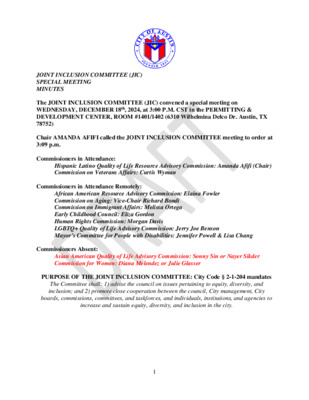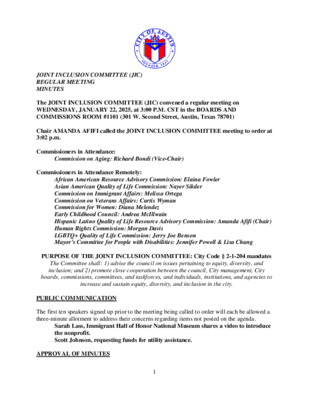Back Up_DRAFT Minutes Joint Inclusion Committee (JIC) Special Called Meeting December 18th, 2024 — original pdf

JOINT INCLUSION COMMITTEE (JIC) SPECIAL MEETING MINUTES The JOINT INCLUSION COMMITTEE (JIC) convened a special meeting on WEDNESDAY, DECEMBER 18th, 2024, at 3:00 P.M. CST in the PERMITTING & DEVELOPMENT CENTER, ROOM #1401/1402 (6310 Wilhelmina Delco Dr. Austin, TX 78752) Chair AMANDA AFIFI called the JOINT INCLUSION COMMITTEE meeting to order at 3:09 p.m. Commissioners in Attendance: Commissioners in Attendance Remotely: Hispanic Latino Quality of Life Resource Advisory Commission: Amanda Afifi (Chair) Commission on Veterans Affairs: Curtis Wyman African American Resource Advisory Commission: Elaina Fowler Commission on Aging: Vice-Chair Richard Bondi Commission on Immigrant Affairs: Melissa Ortega Early Childhood Council: Eliza Gordon Human Rights Commission: Morgan Davis LGBTQ+ Quality of Life Advisory Commission: Jerry Joe Benson Mayor’s Committee for People with Disabilities: Jennifer Powell & Lisa Chang Commissioners Absent: Asian American Quality of Life Advisory Commission: Sonny Sin or Nayer Sikder Commission for Women: Diana Melendez or Julie Glasser PURPOSE OF THE JOINT INCLUSION COMMITTEE: City Code § 2-1-204 mandates The Committee shall: 1) advise the council on issues pertaining to equity, diversity, and inclusion; and 2) promote close cooperation between the council, City management, City boards, commissions, committees, and taskforces, and individuals, institutions, and agencies to increase and sustain equity, diversity, and inclusion in the city. 1 PUBLIC COMMUNICATION The first ten speakers signed up prior to the meeting being called to order will each be allowed a three-minute allotment to address their concerns regarding items not posted on the agenda. None. APPROVAL OF MINUTES 1. Approve the minutes of the JOINT INCLUSION COMMITTEE’s SPECIAL CALLED MEETING on OCTOBER 23RD, 2024. The minutes were approved at the December 18th Special Called meeting on COMMISSIONER RICHARD BONDI’S motion, COMMISSIONER JENNIFER POWELL’S second, on a 7-0 vote (Off the dais: Commissioners Elaina Fowler from the African American Resource Advisory Commission and Morgan Davis from the Human Rights Commission. Absent: Commissioners Sonny Sin and Nayer Sikder from the Asian American Quality of Life Advisory Commission and Julie Glasser and Diana Melendez from the Commission for Women.) STAFF BRIEFINGS 2. Briefing on updates and opportunities for the City’s Open Government Partnership. (Ana DeFrates, Research Program Lead, Office of Innovation; Amanda Jasso, Equity and Inclusion Program Manager) Ana DeFrates serves as the Innovation Research Program Lead with the Office of Innovation where she helps facilitate the work of the Open Government Partnership (OGP) in collaboration with City departments and community members. Ana DeFrates shares …
